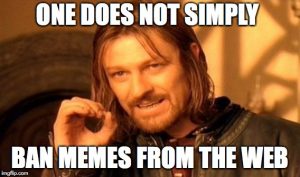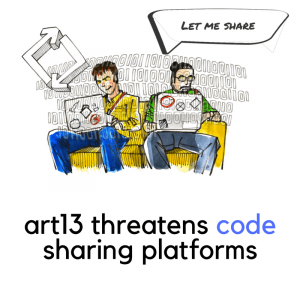The evolution of digital technologies has changed the way works and other protected subject-matter are created, produced, distributed and exploited. New uses have emerged as well as new actors and new business models.
Thus begins the proposed EU Directive on copyright in the digital single market. So far so good. Then why have over 70 ‘luminaries of the internet’ [1] signed a letter opposing the directive? Surely we need to adapt to the opportunities and pressures of the internet as a system of infrastructure, economics and culture? Well, yes, but the proposed legislation is not the way to go about it. And it mostly boils down to Article 13.
Why is Article 13 so bad?
Following the sometimes sensationalist media and political coverage of the directive, there are a number of risks to Article 13 [2]. For example, if the directive is passed, it could:
- Create automated mass surveillance
 – by forcing platforms to actively monitor, check and potentially censor all user content as it is uploaded;
– by forcing platforms to actively monitor, check and potentially censor all user content as it is uploaded; - Censor political debate – by allowing actors to block topics for discussion by publishing them in a copyright (and therefore copyrighted) format;
- Limit the internet as a source of shared knowledge – by making it very difficult for open platforms such as Github or Wikipedia to operate;
- Reduce competition – by entrenching the power of major platforms who already possess the mechanisms to control the flow of information;
- Make memes illegal – by restricting the sharing of copyright materials such as the images often used as the basis for a meme;
- Destroy the internet as we know it – by undermining the principles of open sharing of information that define the internet;
- I propose that it would also create a ‘Great CopyWall of Europe’ – by encouraging international platforms to block European IP addresses rather than follow the problematic regulations.
In more concrete terms, the directive seeks to limit the use of copyrighted material online. While this might seem noble – there are many who rely on their digital intellectual property to make a living – the way in which it has been executed is at best messy and short-sighted, and at worst a highly questionable structure of oppression. It would forcing platforms such as facebook and twitter to acquire licenses for every quote or image (potentially even including hyperlinks) that appears on their sites. The alternative would be for them to actively monitor and speculatively censor their users for copyright infringement in advance. This will fundamentally change the way internet users and internet culture relates to online content and the principle of sharing information upon which the internet was built.
GDPR and Article 13 – two sides of the same twisted coin
In the context of the recent EU regulation on data privacy (GDPR), you can see the bizarre logic that gave rise to the new proposal – giving content creators the same protections for their intellectual property that the GDPR gives to users for their data privacy. The GDPR, while by no means unproblematic, has largely been acknowledged as a useful step in protecting citizens’ privacy. However, rather than complying with the new data privacy requirements, some international organisations have started blocking European IP addresses from accessing their sites. In the case of the GDPR, this perhaps says more about the website’s intentions concerning the misuse of our data (or at least a stubborn insistence on the internet as not only open but also lawless, and therefore enabling free exploitation of users). The new directive on copyright could have the same result for the opposite reason. Rather than protecting user data privacy rights, the excessive protection of copyright could simply persuade major platforms to abandon their European users. When the cost and complexity of micro-licensing becomes higher than revenue received, or the alternative of automated surveillance and censoring of user content is undesirable, then it is likely that we will see a much greater rejection of European users.
Privacy and censorship are closely linked. If we understand privacy as control over access and use of your information, then censorship is clearly part of the same debate. The West is quick to criticise regimes such as China, North Korea or Turkey that attempt to tightly control their citizens’ access to the internet. In the case of China, the blocking of Facebook and other international websites has led to what is commonly called the ‘Great Firewall of China’. If the EU directive goes ahead, and the rest of the world responds by shutting down access by European citizens or IP addresses, then we will face a new Great Wall – one imposed externally and brought on by internal stupidity. In emphasising copyrights over all other rights, the EU would risk inspiring a ‘Great CopyWall of Europe’ which bars Europeans from accessing large swathes of the internet due to the restrictive policies of the directive. Even when the wall remains at least partially open, the automated monitoring of users will come into collision with privacy principles in the mass surveillance and control that would be required to enforce the directive.
In its Explanatory Memorandum, in point 3, under Fundamental Rights the proposal claims that “the Directive has a limited impact on the freedom to conduct a business and on the freedom of expression and information”. Any reference to fundamental rights can be risky. Pull it off and you can create an unassailable position, but misuse them and your whole argument crumbles. The Directive hits the latter, showing a very narrow view of fundamental rights that doesn’t take into account the broader effects of the Directive. If the directive does indeed lead to a ‘Great CopyWall’ around Europe, then there will be a huge negative impact on these freedoms – not only expression but access to any information outside of Europe, as well as reducing the ability of European businesses (large and small) to compete in a global digital market.
What are the implications of this Great CopyWall?
 In one sense, the directive is another stage in the ongoing saga of the ‘are platforms publishers?’ debate. This question is concerned with the responsibility of Facebook, Twitter, etc. for the user-generated content they display, and what editorial role they should play. But the scale of the potential impact and fallout from the directive goes much further. The internet is, of course, an interconnected network. It seems obvious stating it, but it is important to highlight the ripple of effects that will be felt beyond Europe. Cory Doctorow has written about the “depraved indifference” of the EU concerning the effects of the directive on global users, pointing out that closing off Europe would in fact only enhance the dominance of US internet giants over the rest of the world.
In one sense, the directive is another stage in the ongoing saga of the ‘are platforms publishers?’ debate. This question is concerned with the responsibility of Facebook, Twitter, etc. for the user-generated content they display, and what editorial role they should play. But the scale of the potential impact and fallout from the directive goes much further. The internet is, of course, an interconnected network. It seems obvious stating it, but it is important to highlight the ripple of effects that will be felt beyond Europe. Cory Doctorow has written about the “depraved indifference” of the EU concerning the effects of the directive on global users, pointing out that closing off Europe would in fact only enhance the dominance of US internet giants over the rest of the world.
The wall would also close off the potential for many businesses to make money online. It is often through a link (including snippet of text and/or image) shared on social media that sites receive click-throughs and therefore the ability to function and derive revenue (through, for example, advertising but also by directly selling physical or digital products/services). Within the wall, freedom of speech in political contexts is also at risk. At a time when we are already plagued by fake news, the lack of ability to quote sites has potential for misuse during political campaigns by closing off topics of debate by rendering them copyright protected.
For an organisation based on building unity, the EU is stepping dangerously close to fragmenting the internet and establishing an online thought police enforced by corporate automated systems. Rather than such draconian systems of copyright gone mad, the directive should be acknowledging the fact that much sharing of information online can actually benefit the original content creator. For the new ways of interacting with content online we should be looking to models of protecting and sharing intellectual property such as attribution and creative commons. If the directive goes ahead we will instead be locked into an out of date model of information that tries to force the internet back into the principles and structures of material reality. Perhaps the only consolation is that we might finally see and end to clickbait.
For more information, visit: saveyourinternet.eu
- The list of signatories includes Vint Cerf and Tim Berners-Lee (two ‘fathers of the internet’), professors at a number of prestigious universities, as well as the creators, founders and directors of Wikimedia, Mozilla, Python, GNOME, Apache, the Internet Archive and the EFF, and experts on all things internet such as Bruce Schneier and Tim Wu.
- A worthy mention should also go to Article 11, which would impose a ‘snippet tax’ charging publishers and platforms for using even the smallest quote.

Great article! This debate shows how difficult it is to frame internet regulation in a satisfactory way. The wish to prevent hateful comment can quickly become an obstacle to free speech. My concern is (as mentioned in the article) is that smaller platforms don’t have the resources to comply with regulation that large ones do. Ultimately, the solution is that we become more tolerant of content that we object to, but this will take time.
Exactly – rather than enhancing the rights of European content creators (particularly smaller ones), it will end up reinforcing the dominance of the US giants, and exclude European citizens from the rest of the internet in the process.
The “snippet tax” is potentially worse than you have indicated. At present, it is normal to quote snippets from a copyrighted work when reviewing it or referring to it in a discussion in another work. If a copyright owner could potentially block unfavourable reviews or comments by charging an unreasonable sum for the right to reproduce a snippet, this would also have a deleterious effect on freedom of speech. While reviews in hard-copy form would not be affected; they could not be published online.
Exactly! And this spills over into the political sphere. The same maneuvre can also be used to block criticism and commentary in public debates – to me any system that allows this affects not only freedom of speech but the entire structure of European society. It risks closing down online media for so many purposes and undermines our fundamental rights at the same time!